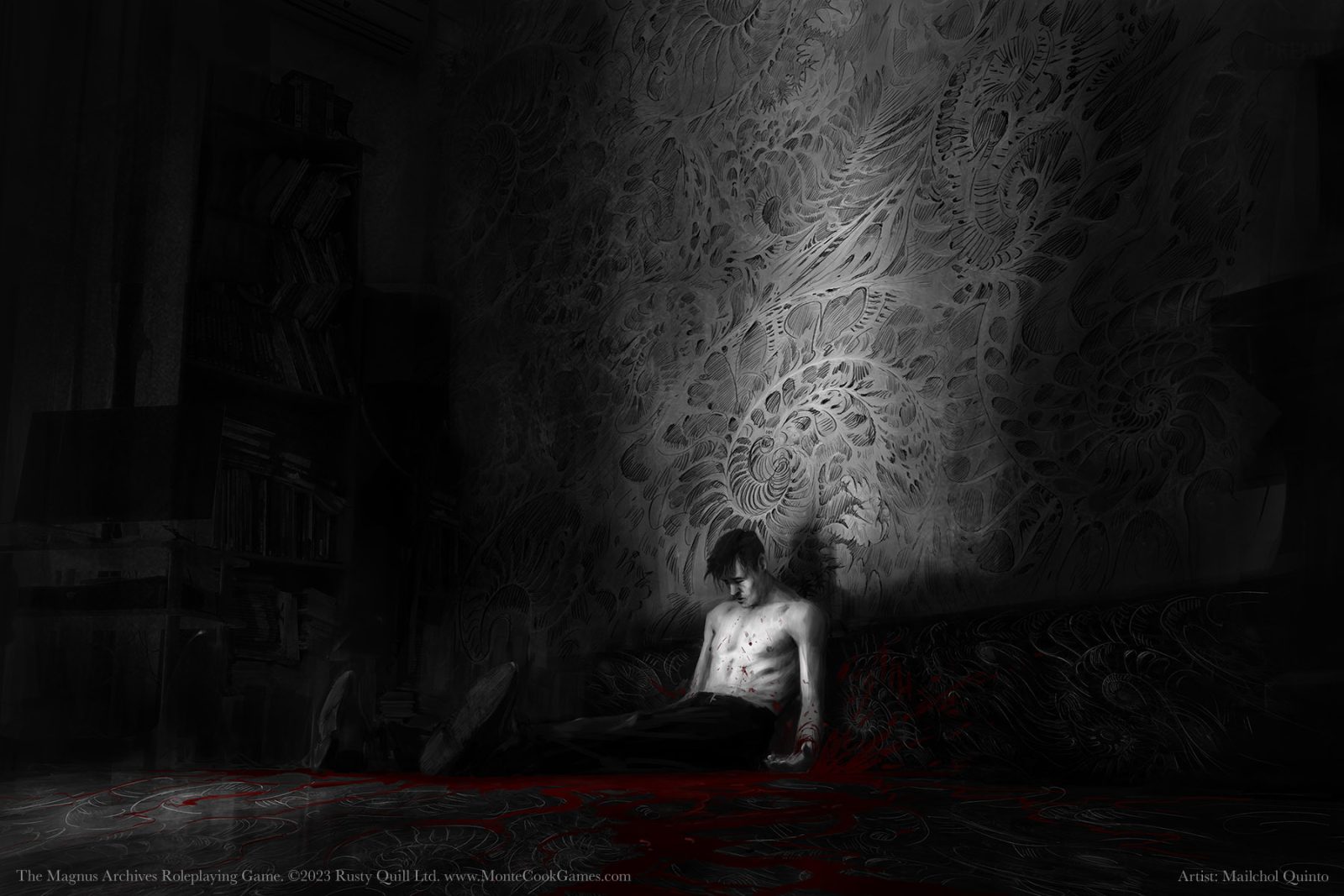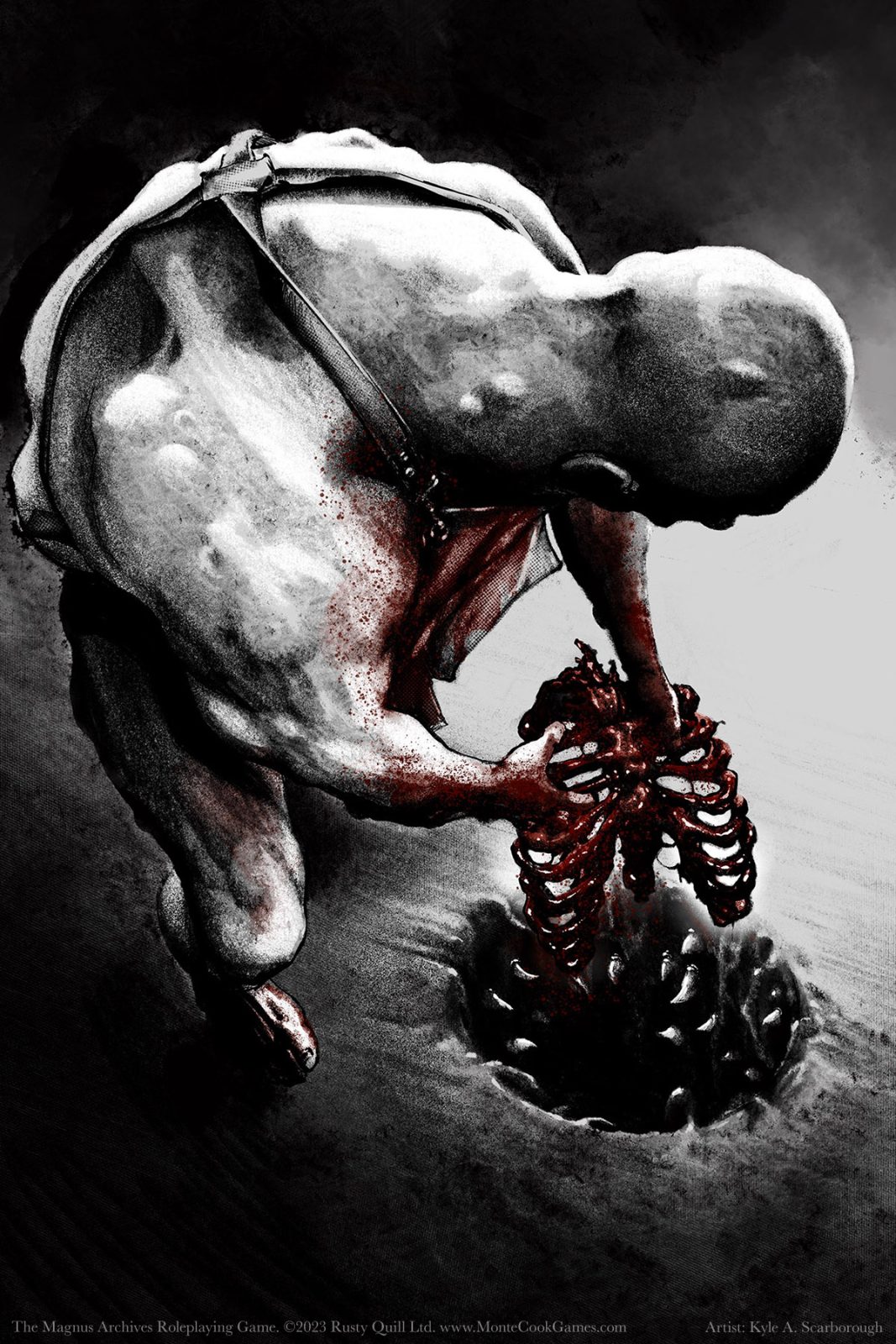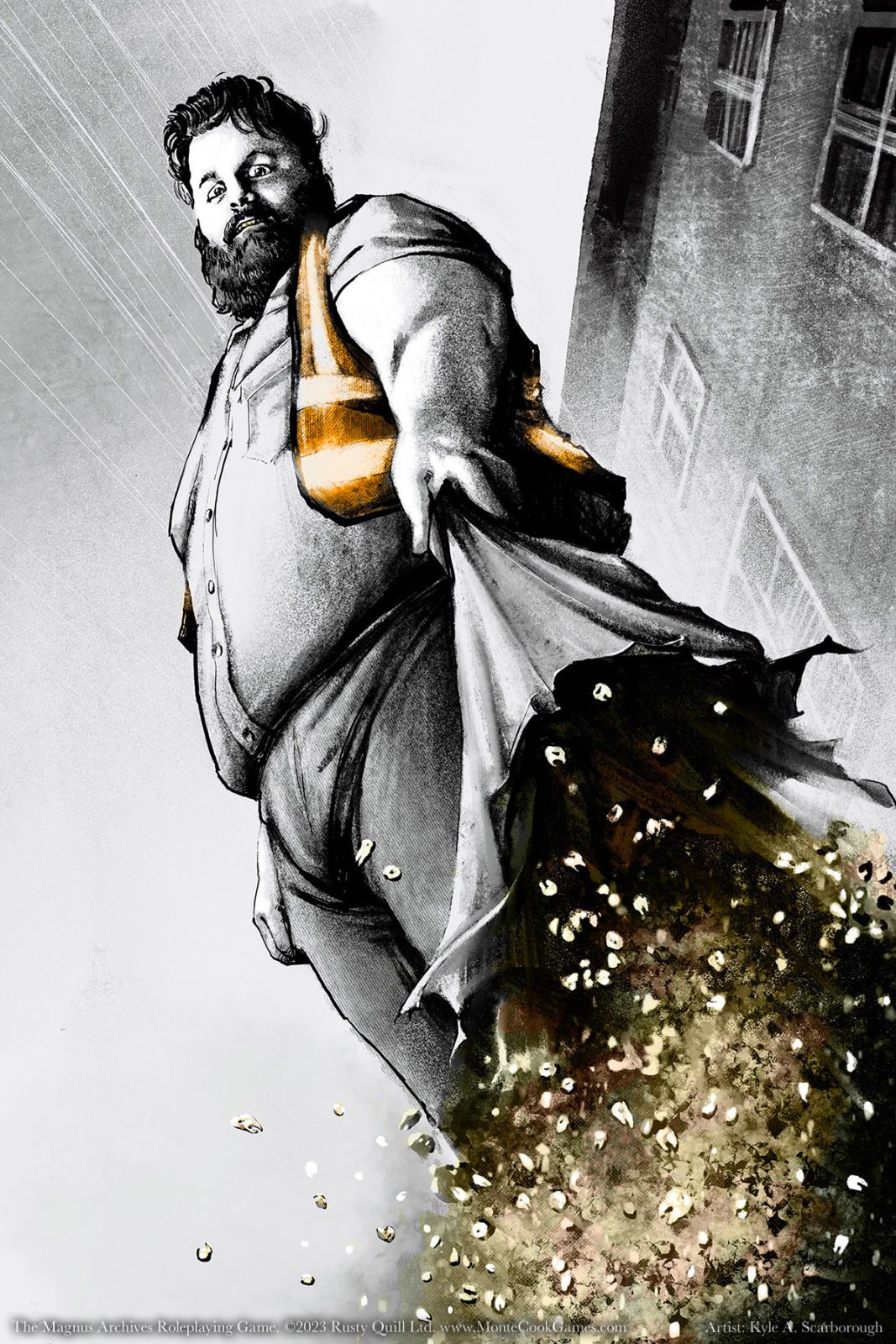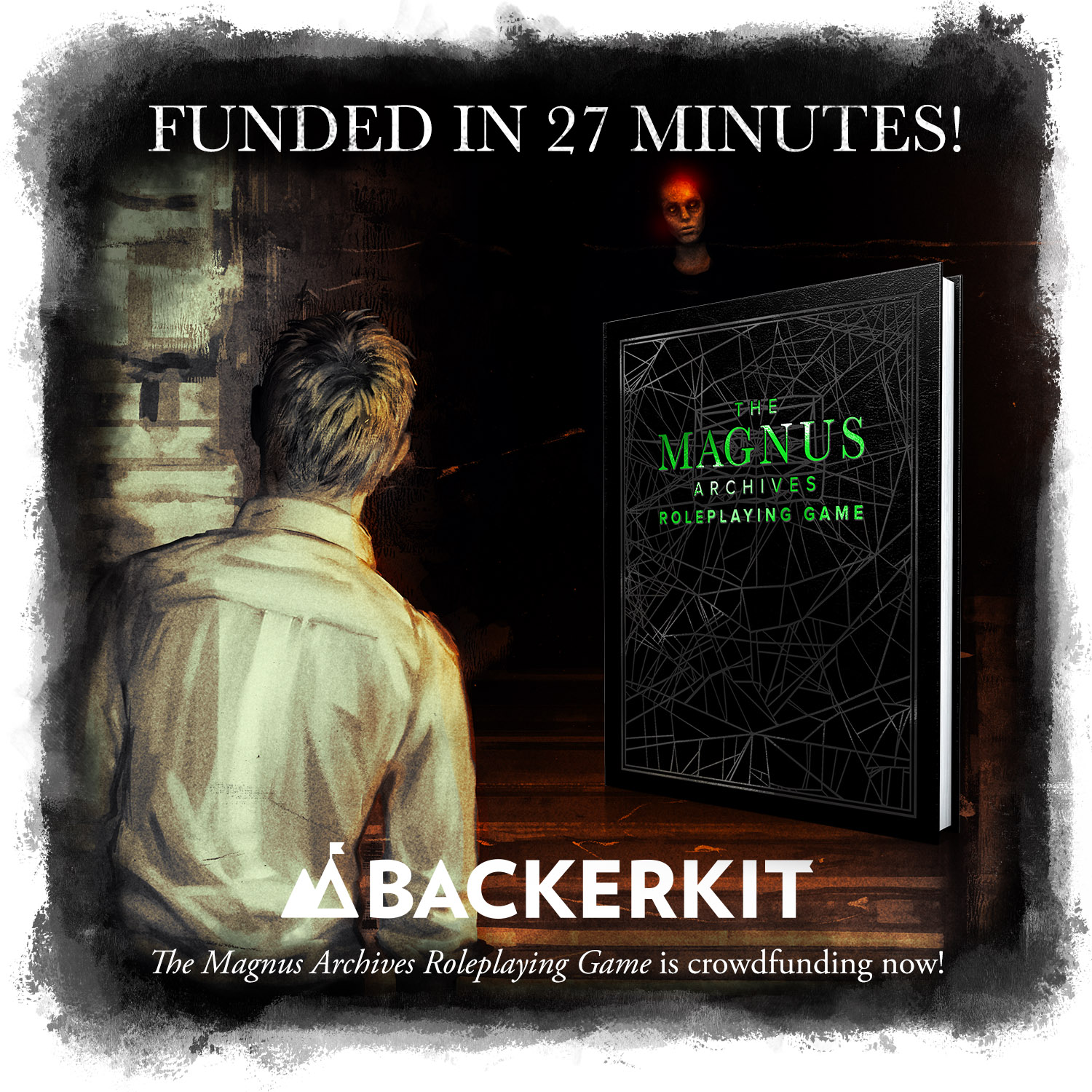As I’ve worked on The Magnus Archives Roleplaying Game, I’ve deviated from the standard Cypher System rules that many of you are familiar with. Fortunately, the Cypher System is robust and flexible, so these additions and changes work with the rest of the rules very nicely, while truly reflecting the dangerous and terrifying world of The Magnus Archives podcast.
Here’s a sample of some of the more substantive changes you’ll find in the rulebook when it comes out next year. The Magnus Archives Roleplaying Game is crowdfunding now.
The Statement
The Magnus Archives Roleplaying Game offers groups the ability to create the foundation of the story—the statement—together. (I’ll have another article, taking an in-depth look at this, soon.) GMs, of course, can create a statement or start an investigation (adventure) any way they wish, but this new system makes everyone feel like they are a part of the world created by the podcast stories.
Stress
As discussed in the rules primer you can download from the crowdfunding page, perhaps the most significant change in The Magnus Archives Roleplaying Game is that, unlike in previous Cypher System games, you do not use your stat pools to track damage suffered. You only use the points in them for effort and special abilities.
Instead, you track stress. Stress isn’t a stat, so to speak. You start with zero stress, and accumulate it as things go on and things get bad. When things get really terrifying, such as when you see an actual ghost, find a sack of human teeth, or see your friend engulfed in a swarm of worms, you gain stress. Small wounds, like cuts, scrapes, burns, bruises, and so on also add stress. Essentially, any time a character takes an injury that might affect them temporarily but is never life threatening, this is tracked as accumulated stress—usually 1, 2 or 3 points. Using magic or other supernatural abilities also gives you stress.

Accumulating stress is bad. Every 3 points of stress gained is known as a stress level. (So you can always track your stress level by dividing your accumlated stress by 3.) Some characters have (or gain) the ability to withstand more stress before it accumulates into a stress level.
Accumulated stress adversely affects a character by imposing a penalty on all actions, hindering them. The more stress a character has, the greater this penalty. Each stress level hinders all actions by 1 step until the stress is reduced.
A desperate character can use their stress as a temporary advantage. If they have at least 1 stress level, they turn that into a one-time bonus on a single action, “burning” the stress and easing the task by 1 step. Doing so represents a sort of manic energy. While the used stress level means a reduction in the character’s stress level, the GM immediately uses an intrusion that increases the overall tension and danger of the situation. Stress cannot be used in this way by a character who is not already in a tense situation, nor can it be used on a defensive action.
Also, in certain situations, characters can “trade” stress for supernatural powers. These powers represent how a character is changed by their experiences. More on that in a moment.
Time in a relatively safe, relaxing space reduces stress by 3 points per hour. Other factors, like food and drink, nearby friends, or even a nice dog to pet can reduce the amount further. Here are a few examples:
| Activity | Additional Stress Reduction |
| Eating or drinking | 3 points immediately (can only be used once a day) |
| Interacting with a pet | +1 point each hour resting |
| Meditation | +1 point each hour resting |
| Interacting with trusted friends | +1 point each hour resting |
The Damage Track

Closely related, the game relies much more heavily on the damage track than other Cypher System games. Basically, if your character sustains a serious injury like a stab in the guts, a gunshot to the leg, a fall from a rooftop, or the body-morphing touch of the Boneturner, the character moves one step down the damage track.
Yes, this makes combats much more deadly.
In The Magnus Archives Roleplaying Game, it’s unlikely that you’ll face multiple serious combat encounters in a single session or even a single investigation. Most of the time, you’ll be interacting with NPCs, solving mysteries, looking for clues, or creeping around dark places with a far-too-unreliable flashlight. You might get into a scuffle with someone, but the result of that is likely going to be stress unless they’re seriously armed.
In the real world, if you take a solid blow with a fire axe in your shoulder, you really should go to the hospital. It’s just like that in the game. If a crazed cultist serving The Hunt hits you with a fire axe and then, as you stumble away (now impaired) from the axe-wielding maniac, the horrible wolf-like thing waiting in ambush clamps down with its impossibly exaggerated maw, well, your best bet is to crawl away (debilitated) and hope your friends find you before these horrors finish you off.
Very tough or hardy characters possess an additional step on their damage track called “hurt.” Hurt is inserted into the track between hale and impaired, and if you’re hurt your actions are hindered. Such a character can suffer a couple of serious injuries before finding themselves facing The End, which is impressive but not so much so that they shouldn’t be really careful.
As characters (particularly those with the Protector type) gain more experience, they can sometimes turn a serious injury into a grazing blow (and thus only suffer stress). But I’ll say this again—when the horrible things spawned by the Entities show up, you should be really scared, no matter what kind of special abilities you have.
Just like in the podcast, characters can die.
Some attacks, like venom from a serpent’s bite, a horrific curse, or the presence of The Distortion, have effects other than stress or shifting the PC on the damage track. These attacks can cause unconsciousness, paralysis, and so on. Not all the fears are about physical damage. An avatar of The Lonely probably doesn’t inflict physical injury upon you at all. But some fates are worse than death.
Configurable Characters
Let’s turn to more pleasant topics. Just like in any Cypher System game, characters have descriptors, types, and foci, (adjectives, nouns, and verbs to build your character sentence). However, player characters in The Magnus Archives Roleplaying Game will be more configurable.
Probably not surprisingly, this game will focus more on skills rather than lots of special abilities, and you’ll have the opportunity to make a lot of choices about what skills your character has. Descriptors, for example, offer a stat pool increase and one skill (but not inabilities). However, you can choose to take an inability to gain an additional skill. Each descriptor provides suggestions for appropriate additional skills and inabilities, but you’re free to create the exact character you want to play.
Likewise, all the character types have access to skills they can choose. And foci? Let’s talk about foci.
Avatar Abilities

Character foci will be (mostly) of a decidedly non-supernatural nature to start with. Interesting, of course, but no one’s going to be wielding a halo of fire—such things are not appropriate to the setting. Characters are just simple investigators for a kooky institute that studies spooks and whatnot, right? None of that stuff is real…
However, once a character accumulates certain levels of stress from interacting with the Entities and their influence in the world, players can choose to have these experiences begin to change the character. An investigator who has been spending far too much time looking into The Corruption starts to see bugs or decay around them where there should not be. Another who has had a dreadful encounter with The Desolation later sees flammable objects nearby begin to smolder.
These characters are gaining new paranormal abilities. Essentially, these new powers replace whatever ability your focus would normally offer at that tier. These supernatural powers are—in game terms—superior to whatever ability they might get at that tier, but the cost is always greater. Depending on the power, the player might not have complete control over their new ability, at least at first. And in what can only be described as horrific irony, using such powers always inflicts additional stress on the character.
Over time, gaining multiple supernatural abilities leads the character down the path of becoming an avatar of one of the Entities. This status has its own advantages, but also even more significant requirements and drawbacks—including physical scarring. deterioration, or outright alteration, and even having one’s life becoming more and more manipulated by the Entity in question. Often these subtle or overt manipulations come in the form of intrusions from the GM, but players never entirely lose their agency (a smart and strong-willed character can use an Entity’s powers against them, just like the Archivist managed to do in the story). Either way, in The Magnus Archives Roleplaying Game, the Entities are the source of all supernatural power, and power comes at a cost.
Sometimes a dreadful cost.
The Magnus Archives Roleplaying Game is a horror RPG based on the wildly popular fiction podcast. For 200 years, the Magnus Institute has quietly collected statements from people of all walks of life, detailing their personal experiences with the supernatural. These disparate statements can be unsettling—even deadly. And as one digs into the archives, the implications become truly terrifying, because these incidents aren’t as unconnected as they seem. But combatting the malicious forces that tie them together is dangerous, when even beginning to understand them might bring you under their influence.
The Magnus Archives Roleplaying Game is crowdfunding now!
